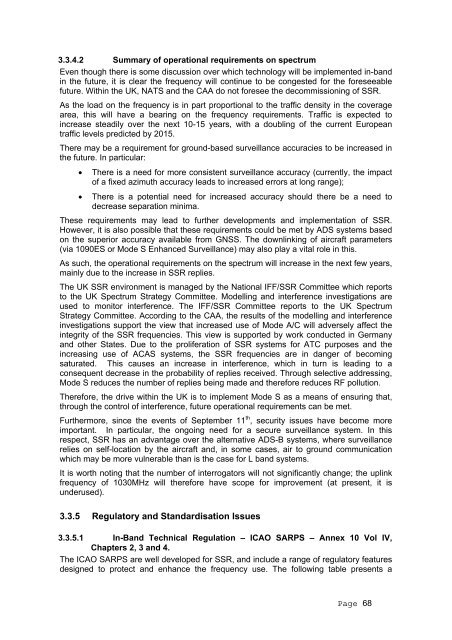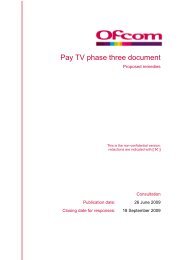FINAL REPORT - Stakeholders - Ofcom
FINAL REPORT - Stakeholders - Ofcom
FINAL REPORT - Stakeholders - Ofcom
Create successful ePaper yourself
Turn your PDF publications into a flip-book with our unique Google optimized e-Paper software.
3.3.4.2 Summary of operational requirements on spectrum<br />
Even though there is some discussion over which technology will be implemented in-band<br />
in the future, it is clear the frequency will continue to be congested for the foreseeable<br />
future. Within the UK, NATS and the CAA do not foresee the decommissioning of SSR.<br />
As the load on the frequency is in part proportional to the traffic density in the coverage<br />
area, this will have a bearing on the frequency requirements. Traffic is expected to<br />
increase steadily over the next 10-15 years, with a doubling of the current European<br />
traffic levels predicted by 2015.<br />
There may be a requirement for ground-based surveillance accuracies to be increased in<br />
the future. In particular:<br />
• There is a need for more consistent surveillance accuracy (currently, the impact<br />
of a fixed azimuth accuracy leads to increased errors at long range);<br />
• There is a potential need for increased accuracy should there be a need to<br />
decrease separation minima.<br />
These requirements may lead to further developments and implementation of SSR.<br />
However, it is also possible that these requirements could be met by ADS systems based<br />
on the superior accuracy available from GNSS. The downlinking of aircraft parameters<br />
(via 1090ES or Mode S Enhanced Surveillance) may also play a vital role in this.<br />
As such, the operational requirements on the spectrum will increase in the next few years,<br />
mainly due to the increase in SSR replies.<br />
The UK SSR environment is managed by the National IFF/SSR Committee which reports<br />
to the UK Spectrum Strategy Committee. Modelling and interference investigations are<br />
used to monitor interference. The IFF/SSR Committee reports to the UK Spectrum<br />
Strategy Committee. According to the CAA, the results of the modelling and interference<br />
investigations support the view that increased use of Mode A/C will adversely affect the<br />
integrity of the SSR frequencies. This view is supported by work conducted in Germany<br />
and other States. Due to the proliferation of SSR systems for ATC purposes and the<br />
increasing use of ACAS systems, the SSR frequencies are in danger of becoming<br />
saturated. This causes an increase in interference, which in turn is leading to a<br />
consequent decrease in the probability of replies received. Through selective addressing,<br />
Mode S reduces the number of replies being made and therefore reduces RF pollution.<br />
Therefore, the drive within the UK is to implement Mode S as a means of ensuring that,<br />
through the control of interference, future operational requirements can be met.<br />
Furthermore, since the events of September 11 th , security issues have become more<br />
important. In particular, the ongoing need for a secure surveillance system. In this<br />
respect, SSR has an advantage over the alternative ADS-B systems, where surveillance<br />
relies on self-location by the aircraft and, in some cases, air to ground communication<br />
which may be more vulnerable than is the case for L band systems.<br />
It is worth noting that the number of interrogators will not significantly change; the uplink<br />
frequency of 1030MHz will therefore have scope for improvement (at present, it is<br />
underused).<br />
3.3.5 Regulatory and Standardisation Issues<br />
3.3.5.1 In-Band Technical Regulation – ICAO SARPS – Annex 10 Vol IV,<br />
Chapters 2, 3 and 4.<br />
The ICAO SARPS are well developed for SSR, and include a range of regulatory features<br />
designed to protect and enhance the frequency use. The following table presents a<br />
Page 68
















